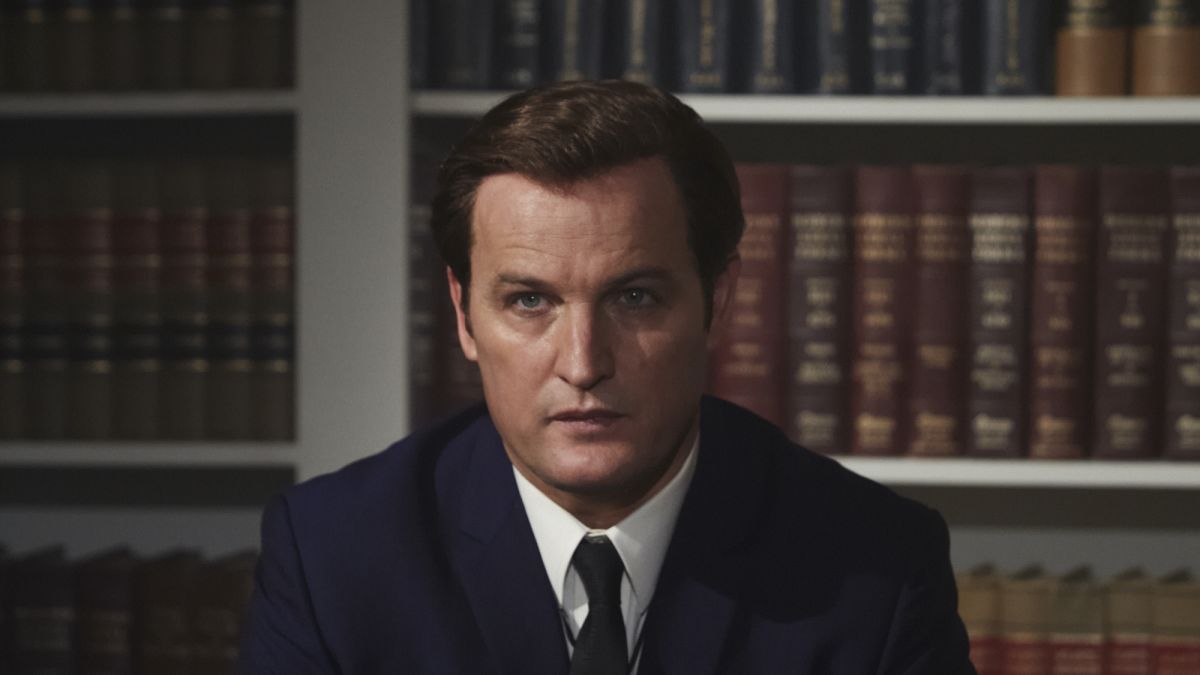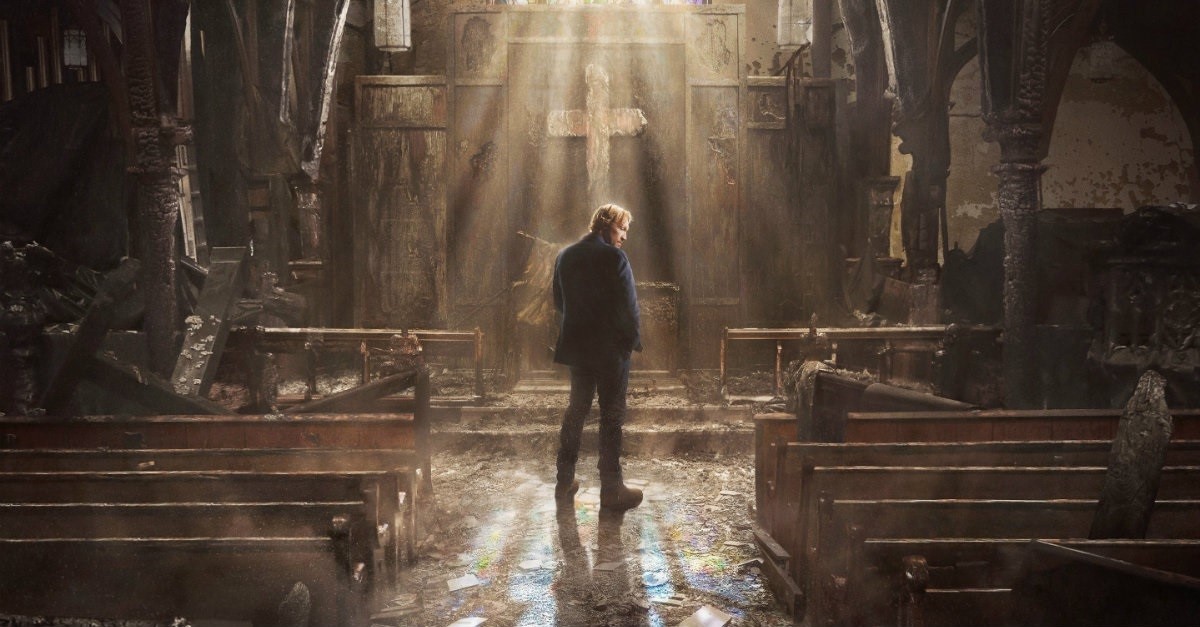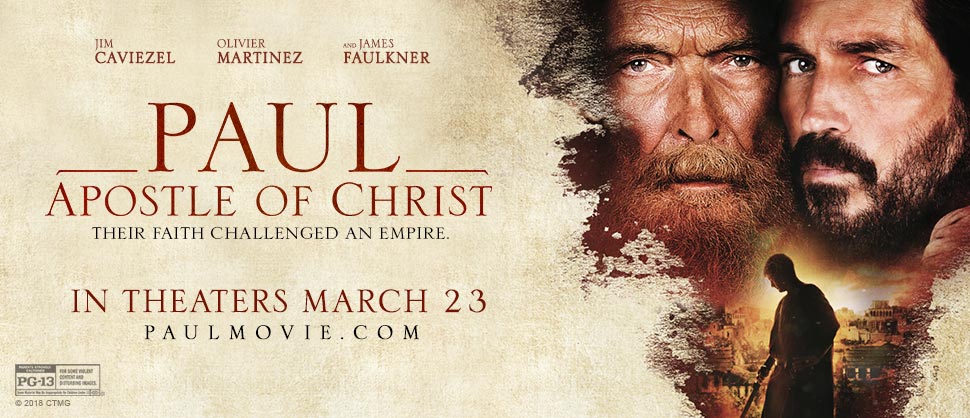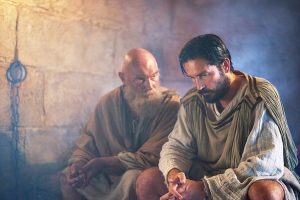
by Michael Foust | Apr 6, 2018
The Miracle Season (PG) opens this weekend, recounting the true story about an Iowa high school team that recovered from the death of a popular and joy-filled star player to compete for another state title.
Caroline is an energetic, optimistic and outgoing teenager who lights up every room and – as her best friend Kelley says – turns “absolutely anything into an adventure.”
She’s also captain of the West High School volleyball team, which won the hearts of the townspeople last season by winning the Iowa state championship. They’re one of the favorites this year, too.
Then tragedy strikes.
Just days into the season Caroline is killed in an accident, devastating not only her team and classmates but also the city that had been inspired by her bubbly personality. Some 4,000 people attend her funeral.
How long will it take for this community to recover from such a devastating event?
The Miracle Season (PG) opens this weekend, recounting the true story about an Iowa high school team that recovered from the death of a star player – Caroline “Line” Found – to compete for another state title. Instead of winning one “for Line,” they drew inspiration from her optimism to “live like Line.”
It stars Helen Hunt (Twister, Mad About You) as Coach Kathy Bresnahan, Danika Yarosh (Jack Reacher: Never Go Back) as Caroline “Line” Found, Erin Moriarty (Jessica Jones) as Caroline’s friend Kelley, and William Hurt (Captain America: Civil War) as Caroline’s father, Ernie.
The Miracle Season surprised me. Consider: How many successful films have been made about high school volleyball? But it has a solid storyline and a nice message, and even a few biblical lessons, too.
It also fills a void at the box office: films spotlighting female sports. Most movies in this category (A League of Their Own, Million Dollar Baby) involve sports that females on the high school and college level don’t play.
Let’s examine the details.
Warning: minor/moderate spoilers!
Violence/Disturbing
Minimal. Police deliver the news of Caroline’s death – she died in a moped crash – to her father. (We don’t see the crash.) We also learn of another person’s death. We see Caroline’s funeral.
Sexuality/Sensuality/Nudity
Minimal. We hear a joke about a married man “getting lucky” with his wife. A husband and wife kiss. We hear discussion of two teens kissing. Later, we see teens kissing twice.
Coarse Language
None/minimal. OMG 4, butt 2, suck 2, pi—ed 1.
Other Positive Elements
Caroline’s father develops a father-daughter type relationship with Kelley, who replaces Caroline as captain. It’s touching to watch.
Some of Caroline’s opponents from other teams attend her funeral.
Life Lessons
Perhaps to some moviegoers, The Miracle Season will seem hokey or trite: a community comes together by rallying around a volleyball team. But such an opinion overlooks the significance that sports can play in teaching us to overcoming adversity and tragedy. In fact, sports can teach us multiple lessons about life.
The primary lesson from the film, though, isn’t about adversity. It’s about living life with joy. In the real world, Caroline Found was a Christian whose faith gave her the hope to shine for Jesus. She was involved in Young Life. People wanted to be around her. At the movie’s end, West High fans sported “Live Like Line” t-shirts – a reference to her contagious view of life.
Worldview
Few of us ever will face the tragedy that Ernie Found faced, and the movie shows him struggling with doubt. “God hasn’t exactly showed up for me lately,” he says at one point. But by movie’s end – thanks in part to assistance from a Christian friend – Found draws strength from his faith: “I know how blessed I am.”
Scripture tells us that Jesus can “sympathize with our weaknesses” (Heb. 4:15). The Gospels even depict Jesus as grieving and weeping (John 11:35).
We don’t know why Caroline Found was killed, but we can see the good that came out of that tragedy (Rom. 8:28). Such verses may not bring instant healing, but over time, they can help give us a glimpse of God’s tapestry.
What Works
Few of us know the intricacies of volleyball strategy, but the film does a nice job explaining what we’re watching on-screen. The volleyball action is believable, too. Finally, the father-daughter type relationship between Ernie Found and Kelley brought tears to my eyes.
What Doesn’t Work
Although the volleyball action is believable, the crowd shots – and the PA announcer – are not. But few sports films get this element right. (If you want to watch one that does it right, check out Woodlawn.)
Discussion Questions
- What good came out of Caroline’s death? Should that help bring comfort to the family?
- Why was Caroline filled with joy? Why aren’t we living like that?
- What can we learn about overcoming tragedy and adversity from the story of West High?
Entertainment rating: 3 out of 5 stars. Family-friendly rating: 4 out of 5 stars.
The Miracle Season is rated PG for some thematic elements

by Michael Foust | Apr 5, 2018
The film Chappaquiddick (PG-13) opens this weekend, telling the story of what has become the most-investigated car crash in U.S. history.
It’s not easy being the younger brother of a former president. Or the younger brother of the former attorney general. Of the son of a former FDR official.
For Edward “Ted” Kennedy, though, it’s just part of life in 1969 America. Expectations always have been high, and with his two older brothers now dead following assassinations, the Kennedy mantle has been passed to him.
“What’s it like walking in that shadow?” a reporter asks.
The sky is the limit for this youngest Kennedy, who already has been elected to the U.S. Senate and is now majority whip. Friends and big-money donors even are encouraging him to run for president in 1972.
But all that changes one night in July 1969 – the very night that Neil Armstrong and Apollo 11 are heading to the moon. After hosting a party on Chappaquiddick Island for some friends, Kennedy leaves the party with Mary Jo Kopechne, a single woman who had worked on his brother Robert’s presidential campaign. Minutes later, they are speeding down a dirt road, and within seconds, he has driven off a bridge and into the water. Kopechne is killed; Kennedy survives, and his legacy is forever tied to the incident.
The film Chappaquiddick (PG-13) opens this weekend, telling the story of what has become the most-investigated car crash in U.S. history. It stars Jason Clarke (Everest) as Kennedy, Kate Mara (Captive, Fantastic Four) as Kopechne, and comedian and actor Jim Gaffigan as Paul Markham.
Director John Curran and writers Taylor Allen and Andrew Logan said their goal was to make a movie based solely on the facts and one that doesn’t promote conspiracy theories. Perhaps they accomplished that – I’ll let historians debate the details – but I do know they weaved an engrossing story that left me outraged at Kennedy while also feeling empathy for him. The movie shows Kennedy and his father’s legal team working to cover up the facts. It also shows Kennedy working futilely to live up to his father’s enormous expectations as the latter tells him: You won’t ever be great.
Here are the details:
Warning: minor/moderate spoilers!
Violence/Disturbing
Minimal. We see Kennedy drive off the bridge, and then divers trying to get the body. We also see officials examine Kopechne’s clothed body. In flashbacks and re-creations, we see Kopechne fight to get out of the car.
Sexuality/Sensuality/Nudity
Minimal. We see two women in one-piece swimsuits on a beach. Men strip down to their underwear to try to save Kopechne.
Coarse Language
Moderate. At least 28 coarse words: h-ll 7, s—t 5, OMG 3, d—n 3, a—2, misuse of “Christ” 2, misuse of “Jesus” 2, f-word 2, SOB 2.
Other Stuff You Might Want To Know
I’m a stickler for historical accuracy. This means during any history-based film, I’m asking: Did that really happen? I asked that a lot during Chappaquiddick – which isn’t surprising with a story surrounded by conspiracy theories. Questioning the narrative in such a film isn’t a bad thing. It can drive us back to the history books, forcing us to search for the facts.
Life Lessons
Kennedy is a complicated character in Chappaquiddick. At first, he tries to cover up what happened. Then he changes his mind, telling his dad he’s going to do the right thing. Then he changes it back. And then he changes it again. Finally, he changes it again. It’s a modern-day parable with a tragic ending, and it includes life lessons on telling the truth, covering up the facts and deceiving others. What would each of us have done? After all, isn’t denial often our first reaction when caught in sin?
For parents, there’s also a lesson to be learned about placing expectations on children. Kennedy’s ill father is cruel to him throughout the film. It’s difficult to watch.
Finally, let’s not overlook the compromising situation in which Kennedy put himself. He was a married man with children, partying and then in the car with a single woman.
Worldview
Scripture warns us: “You may be sure that your sin will find you out” (Num. 32:23). If we’re honest, most of us can list an example from our own lives where that happened. Thankfully, though, our personal-and-embarrassing moments aren’t portrayed on the big screen as they are in Chappaquiddick.
Additionally, even the sins we think we have escaped in this world are known by an omniscient, omnipresent God: “Nothing in all creation is hidden from God’s sight. Everything is uncovered and laid bare before the eyes of Him to whom we must give account” (Heb. 4:13). One day, all of us will answer for our sinful deeds.
What I Liked
Clarke is great as Kennedy, masterfully copying the mannerisms, the accent and the quirks. The screenplay, too, is well-written. It’s not easy making a movie when everyone knows how it will end. But in Chappaquiddick, I never lost interest. It is well-produced. Also, hats off to the filmmakers for staying away from a possible Kennedy-Kopechne love story. We don’t even see them kiss. Kennedy’s reaction to his father’s harmful words is enjoyable, too.
What I Didn’t Like
The strong language.
Discussion Questions
- In America, are you more likely to get away with a crime if you are wealthy?
- Should Kennedy’s legacy have been tarred because of Chappaquiddick? If he had told the truth, would it/should it have made a difference?
- Do our sins always find us out (Num. 32:23)?
- Did the expectations that his father placed on him change your attitude about Kennedy?
Chappaquiddick is rated PG-13 for thematic material, disturbing images, some strong language, and historical smoking.
Entertainment rating: 3.5 out of 5 stars. Family-friendly rating: 3 out of 5 stars.

by Michael Foust | Mar 30, 2018
Ready Player One is a modern-day parable with a great message for all of us: Get off your high-tech devices, spend time with your friends and family and live life in the real world. Sadly, though, much of the content is not family-friendly.
Wade is a technology-crazed teenager living in a technology-crazed world.
Sound familiar?
This world, though, is much different from modern-day America. The year is 2045, and Wade is fighting for survival in a depressing, dystopian world where people have forgotten how to work.
He lives with his aunt in a rusted, high-rise trailer park in Columbus, Ohio, and he passes his time doing what most Americans do: playing in an interactive virtual reality world called the OASIS, where people can be who they want to be and where the limits are – you guessed it – your imagination.
In 2045, this is what people do when they’re not eating or sleeping. They don a virtual reality headset and explore a fake world. Everyone has an avatar, but – here’s the catch – no one knows whose avatar is whose. The reason for the secrecy is simple: They are racing to find a hidden “Easter egg” within the game that was placed there by OASIS creator James Halliday – a find that would net the winner ownership of OASIS and presumably wealth, too. If someone is getting close to finding the Easter egg – and if other players know who that person is – then he or she might be hunted down and killed in the real world.
For Wade (avatar: “Parzival”), the race to find the Easter egg is going great. In fact, he’s in first place. But then he falls in love with a female avatar. And then he unveils his real-world name. And then a bad guy who heads a company called Innovative Online Industries tries to locate him in the real world and kill him.
It’s all part of Ready Player One (PG-13), which opens in theaters this weekend and is based on the 2011 bestselling novel by Ernest Cline. It was directed by Steven Spielberg and stars Tye Sheridan (X-Men: Apocalypse) as Wade/Parzival, Olivia Cooke (Me and Earl and the Dying Girl) as his romantic interest Samantha/ Art3mis, and Ben Mendelsohn (Rogue One) as the head of Innovative Online Industries.
Ready Player One is a modern-day parable with a great message for of all of us: Get off your high-tech devices, spend time with your friends and family and live life in the real world. Sadly, though, much of the content is not family-friendly.
Violence/Disturbing
Moderate/Extreme. It’s not as bad as modern-day violent video games – there’s not as much shooting – but it could be quite intense for children. The movie begins with scenes of Fast and the Furious-type cars racing and crashing in city streets. King Kong and a T-rex try to smash the cars. Later, we see the boyfriend of Wade’s aunt punch him. One specific avatar has a skeleton for a chest. One of the main character’s family dies in an explosion. Guns are pointed and often shot. A massive war-type battle takes place. We see more punching and fighting. We see lots of zombies. We see an alien-type monster explode out of an avatar’s chest. Perhaps the film’s most disturbing scenes involve a re-creation from parts of the horror film The Shining. We see the spooky girls, blood spilling down the hallway, and zombies chasing and trying to eat the good guys. Much of it is played for chuckles, but I’m not sure children will be laughing.
Sexuality/Sensuality/Nudity
Moderate. Art3mis wears a skin-tight virtual outfit that shows her back. Later, she wears a quite-revealing dress when she and Parzival dance provocatively in a nightclub. The most concerning scene involves a real-world woman getting out of a bathtub and walking toward a male character (she turns into a zombie). She’s nude, although due to camera tricks the viewer only sees her head, back and legs. In the film’s opening scene, we briefly see an overweight, dressed woman wearing a virtual reality headset and dancing on a pole.
Coarse Language
Moderate/Extreme. About 36 coarse words: s—t (14), h-ll (8), a—(3), d—n (1), f-word (1), d—k (2), GD (2), G-d (1), OMG (2) and p-ssed (2). That’s a lot for a movie aimed at an audience that includes tweens and teens. It also seemed the writers placed some of the words in scenes just for effect – to make the characters sound “cool.” They seem out of place.
Other Positive Elements
Samantha was born with a birthmark on her eye and uses her hair to cover it. Wade sees her in the real world and tells her he likes the way she looks – birthmark and all.
Life Lessons
Ready Player One gives us lessons on the dangers and pitfalls of technology, the limitations of a virtual reality world and the need to stay grounded in reality.
Worldview
Technology has one primary purpose – to make things easier, convenient and, above all, to improve our lives. Washing machines did that. Dishwashers, too. The list is long.
But if we’re honest, can we truly say that the latest wave of technology – smartphones, tablets and high-tech video games – has been a net-plus for society? Consider: A 2015 study by Microsoft showed that our attention spans have fallen in recent years, from 12 seconds to eight seconds. This means we’re more distracted than ever from the more important things in life: Nature. Friends. Family. God. We don’t want to deal with real-world problems. We’ve got to check Facebook! And we haven’t even discussed the addictive nature of these devices. Some researchers argue they can be as addictive as drugs.
The Bible tells us to “be still” and worship Him (Psalm 46:10), but is that possible when our smartphones are constantly beeping with alerts and texts – and we’re engrossed in social media? Nielsen tells us that the average American stares at a screen 10 hours a day.
Wade said it best at the end of the film: We need to spend more time in the real world.
Discussion Questions
- How long could you live without your smartphone? What would you miss most?
- Do you think smartphones have been a net-plus or a net-minus for society?
- Do you think the future of America and the world will resemble the world in Ready Player One?
- What steps can we take to ensure we’re not addicted to technology?
Entertainment rating: 3 out of 5 stars. Family-friendly rating: 2.5 out of 5 stars.
Rated PG-13 for sequences of sci-fi action violence, bloody images, some suggestive material, partial nudity and language.

by Michael Foust | Mar 30, 2018
Pure Flix’s God’s Not Dead: A Light in Darkness (PG) opens in the theaters this weekend, picking up where God’s Not Dead 2 left us. But even though A Light in Darkness is the third movie in the God’s Not Dead series, it has a different feel and message.
Dave Hill is co-pastor of a thriving, historical church that’s a lot like any other congregation today. It stands firm on God’s Word. It reaches out to the downtrodden. It provides hope for a lost world.
Sunday after Sunday, Hill tells his members that “God is good, all the time,” but lately, he’s struggled with his faith.
Those doubts began creeping in when his co-pastor and good friend was killed in an accident. Then, the church building caught fire and was condemned. Soon thereafter, the university where the church resides decided to boot the congregation from campus, all in the name of eminent domain.
Pastor Dave wants to fight the college in court – with the help of his atheist attorney brother – but that only adds to his stress when divided residents start picketing the church.
“I think it’s time for Christians to stand up for themselves,” he says.
The growing controversy has made him famous and placed him on the talk-show circuit, but he has begun wondering: Is the legal battle helping or hurting the cause of Christ?
Pure Flix’s God’s Not Dead: A Light in Darkness (PG) opens in the theaters this weekend, picking up where God’s Not Dead 2 left us: with Pastor Dave (David A.R. White) being held in contempt of court for not handing over his sermon transcripts to the government in a separate legal battle.
But even though A Light in Darkness is the third movie in the God’s Not Dead series, it has a different feel and message. It is more evenhanded in its portrayal of atheists, thanks to the back-and-forth between Pastor Dave and his brother, Pearce (played admirably by John Corbett – My Big Fat Greek Wedding). The movie also has an ending that likely can be embraced by both sides – something that could not be said of the first two films.
In addition to White and Corbett, it stars Ted McGinley (Do You Believe?) and Oscar winner Tatum O’Neal (The Runaways) as university officials, and Jennifer Taylor (Two and a Half Men) as Pastor’s Dave’s romantic interest.
I didn’t care for the first God’s Not Dead film but enjoyed God’s Not Dead 2. I liked the latest one even more. It’s the best God’s Not Dead movie yet.
Warning: minor/moderate spoilers!
Violence/Disturbing
Minimal. One character punches another one in the face. They roll to the ground before the fight ends. A brick is tossed into a house. Later, we see another character punch someone in the face. We see a character arrested and in jail.
Sexuality/Sensuality/Nudity
None. The movie follows a pair of romances. A college student kisses another student on the cheek. They eventually break up. We see a college girl swim in an indoor pool in a one-piece swimsuit.
Coarse Language
None
Other Positive Elements
See Worldview, below.
Other Stuff You Might Want To Know
If you bring children, then be prepared to discuss atheism and church dropouts. Some of the college students describe how they stopped going to church after leaving home. Others openly question the existence of God. We see a college party with some students drinking.
The movie’s plot is also worth mentioning. Perhaps you’ve wondered: Why is a church located on university property in the first place? Answer: Its location preceded the university’s founding. They had co-existed harmoniously … until now.
Life Lessons
A Light in Darkness gives us solid lessons on humility, forgiveness, civility, hope, healing and unity.
Worldview
Our culture thrives off divisiveness. Television’s top-rated talk shows are the ones where one side blasts the other side. It’s the same on radio, too. It seems everywhere we turn – from our email inbox to our Facebook timeline – people are trying to drive “clicks” by angering and dividing us.
Are humility and unity a thing of the past? God’s Not Dead: A Light in Darkness tells us they’re not. That’s good news, because Scripture commands Christians to “count others more significant than yourselves” (Phil. 2:3) and the church to have “unity of mind” (1 Pet. 3:8) with “no divisions” (1 Cor. 1:10).
Of course, we also are to “stand firm in the Lord” (Phil. 4:1) with courage and strength (1 Cor. 16:13). We’re not to compromise God’s Word.
How, then, do you find the balance? Perhaps this popular-but-anonymous quote sums it up best: “in essentials, unity; in non-essentials, liberty; in all things, charity.” In the newest God’s Not Dead, we see that on display.
What I Liked
The interaction between the two brothers. It’s entertaining. Corbett is impressive. The legal drama is engrossing, too.
Most simulated TV broadcasts in movies look fake. In this film, they look quite believable.
I liked the ending, too.
What I Didn’t Like
One of the movie’s fights seemed odd and out of place. I wrote in my notes: “That fight was dumb.”
Discussion Questions
- Should Pastor Dave have continued his legal battle?
- List five issues in which Christians should never back down. List five issues in which there is room for disagreement.
- Have you ever doubted God?
- Is our culture too divided? What’s the cure?
Entertainment rating: 3.5 out of 5 stars. Family-friendly rating: 4.5 out of 5.
Rated PG for thematic elements including some violence and suggestive material.

by Michael Foust | Mar 23, 2018
The movie Paul: Apostle of Christ (PG-13) opens in theaters this weekend, giving us a powerful story that is sure to inspire moviegoers to live boldly for Christ. Our reviewer calls it one of the best Bible movies he’s seen.

The year is A.D. 67, and Emperor Nero – the cruel Roman ruler you read about in history books – is on a rampage.
At night, his soldiers tie up Christians on street posts and set them ablaze. During the day, the soldiers round up the other Christians and take them to the arena, where they are eaten by lions to appease the blood-thirsty oligarchy.
If that weren’t bad enough, the Christians’ wisest leader – the Apostle Paul — sits in a dark and dirty prison awaiting execution.
“His work for Christ has come to an end,” says Luke, Paul’s young and courageous close friend.
Christianity’s future seems bleak, but Luke has a plan. He will visit and interview Paul to make a written record of the apostle’s incredible life. This document (Acts) then will be copied so that it can encourage the persecuted church and help spread Christ’s message to the ends of the earth.
Luke’s idea is a risky one – he faces death if it’s discovered he’s a Christian and not simply a concerned physician – but it just may be worth it.
The movie Paul: Apostle of Christ (PG-13) opens in theaters this weekend, starring James Faulkner (Downton Abbey) as Paul, Jim Caviezel (The Passion of The Christ) as Luke, British actress Joanne Whalley as Priscilla, and Irish actor John Lynch as Aquila.
The film follows two narratives: 1) Paul’s recapping of his life to Luke, and, 2) Priscilla, Aquila and the other Christians debating how to respond to Nero’s persecution. (Should they flee Rome? Stay in Rome? Take up arms and rescue Paul and the other believers?)
It is part biblical fact and part biblical fiction, although the film’s writers did a masterful job of weaving together a believable narrative that’s full of Scriptural references. For example, we know from Scripture that the churches in the New Testament took up collections to help one another, and they did in the movie, too, as Luke hands Aquilla a bag of coins from a sister congregation. We know from Scripture there were false teachers in the church, and in the film we hear that Titus and Timothy have “straightened” them out. We also know the New Testament church cared for widows and orphans, and in the movie we hear Priscilla assert that the Christians should remain in Rome solely to care for those vulnerable groups.
Faulkner, though, is the heart and soul of the movie, delivering a powerful performance that is sure to inspire moviegoers to live boldly for Christ.
“Everything I have done, I have done for Christ,” he says.
Faulkner’s character quotes Scripture often, but it always sounds as if it’s being said for the first time in history – and not read dryly from the pages of the New Testament.
Paul: Apostle of Christ is one of the best Bible movies I’ve seen. Let’s examine the details.
Warning: minor spoilers!
Violence/Disturbing
Moderate. We see charred bodies on street posts. Later, we see a soldier douse a Christian with a liquid, then set him on fire. A soldier kicks Paul – who is lying on the ground — in the back. We see bloody scars on Paul’s back. We hear a mom reference how a soldier took and killed her baby. Paul discusses how he hunted down and killed Christians. We see drops of blood on the ground from Stephen’s martyrdom. A Roman official grabs a woman by the throat. A soldier gets stabbed. Luke performs a medical procedure and drains blood from a patient. We see Christians walking into the arena, but we don’t see them eaten or killed. We see a character preparing to be beheaded; we see the sword raise, but nothing else.
Sexuality/Sensuality/Nudity
None.
Coarse Language
None/minimal. Luke calls the prison a “h–lhole.”
Other Positive Elements
The Christian love between Luke and Paul is admirable.
Luke and Paul oppose violence against the Romans. “We cannot repay evil with evil,” Paul says. “Evil can only be overcome with good.” Says Luke, “Love is the only way.”
Other Stuff You Might Want To Know
Priscilla and Aquilla have a disagreement over whether the Christians should flee Rome (The disagreement never reaches an argument.) The movie references Roman gods and sacrifices to gods.
Life Lessons
The movie is full of spiritual lessons, including: generosity (multiple characters), brotherly love (multiple characters), standing firm in your faith (Paul, Luke, others), redemption (Paul), forgiveness (multiple characters) and risking your life for the Gospel (multiple characters).
Worldview
God calls us to live life with an eternal focus (Col. 3:2; 1 Pet. 4:7-11), but few of us in the 21st century do that. On most days, we’re focused on – and stressed out over – the temporal.
Paul’s focus was on heavenly matters. When told that he faces certain death, he continues preaching the Gospel, knowing that such an action will only hasten his execution. Later, when he has a chance to escape the prison, he refuses to leave. He also expresses dismay over his “thorn” in the flesh and his sinful past, but then adds that Christ’s “grace is sufficient.”
As he says, his goal is to do “everything” for Christ. May that be our goal, as well.
The church father Tertullian (AD c. 155 to c. 240) famously said, “The blood of the martyrs is the seed of the church.” He was referencing a paradox: The Christian faith grew despite that fact that Christians were beaten, tortured and killed for their faith. In Paul: Apostle of Christ, we see this paradox on the big screen – and it is inspiring to watch.
What I Liked
The screenplay. Faulkner’s performance. Watching minor biblical characters interact on the big screen. Seeing Christians debate – in a mostly gracious manner – their strategy.
What I Didn’t Like
Not applicable.
Discussion Questions
- What gave Paul and Luke such a bold faith?
- Would you be willing to die for the gospel?
- How has your faith been challenged lately?
- Should the Christians have fled or stayed in Rome?
- Why did the gospel continue to spread, despite persecution?
Entertainment rating: 4 out of 5 stars. Family-friendly rating: 3.5 out of 5 stars.
Paul: Apostle of Christ is rated PG-13 for some violent content and disturbing images.





